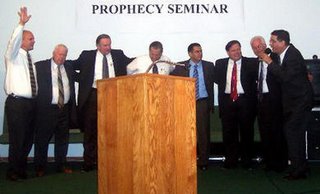
Sometimes when talking to Trinitarian friends we hear the phrase, “When it comes to baptism, I’d rather obey Jesus than obey Peter.” This usually comes after we’ve shown them Acts 2:38,
“Then Peter said unto them, Repent, and be baptized every one of you in the name of Jesus Christ for the remission of sins, and ye shall receive the gift of the Holy Ghost.”
The part that bothers them is that Peter said to be baptized in the name of Jesus Christ, and they see that as contradicting what Jesus said in Matthew 28:19,
“Go ye therefore, and teach all nations, baptizing them in the name of the Father, and of the Son, and of the Holy Ghost.”
Which is the right way to be baptized?
When a Trinitarian friend says that they’d rather obey the words of Jesus they imply that Peter may have been mistaken, but Jesus, of course, could never be mistaken. By asserting this they essentially shot themselves in the foot, among others, for the following reasons.
1. He is admitting there’s a contradiction in the Scriptures. He assumes Peter was wrong when he said baptism was in Jesus’ name. Then, ALL Scripture would NOT be inspired of God as Paul asserts in 2 Timothy 3:16. No true Christian should ever make such an affirmation. It destroys the trustworthiness of the Bible.
2. If there's a contradiction between both scriptures, then the Holy Spirit made a mistake, because Peter had just received the anointing of the Holy Ghost (Acts 2:1-4) and this was supposed to have given him the power to be a witness of Jesus (Acts 1:8).
3. If the Holy Ghost can make a mistake, then, how can we trust the rest of the Scriptures? How can we know which parts are true and which are in error?
4. We must also remember that Jesus never wrote an epistle. Matthew is the one that reports Jesus commanded to baptize in the name of the Father, and of the Son, and of the Holy Ghost. This would not be a case of Jesus vs Peter, but Matthew vs Peter (IF there was a contradiction).
5. If there was such a disagreement between Peter and Matthew, why did Matthew, on the day of Pentecost, say nothing but rather stood with the other Apostles backing up what Peter was preaching? Why did Matthew not correct Peter, if Peter was mistaken? (Acts 2:14).
6. Why did Jesus give Peter the keys to the kingdom of heaven if He knew that the day Peter was to receive the Holy Spirit he would disobey and betray His instructions?
The only solution to harmonize this apparent contradiction is to see in Matthew 28:19 the commandment and in Acts 2:38 the fulfillment or obedience to the commandment of Jesus. Both scriptures are true. The “name” of the Father, and of the Son, and of the Holy Ghost is Jesus!
In other words, the Spirit that was in Peter reminded him of the words of Jesus, and gave him the Name that should be called on the baptismal waters. Matthew, being present, full of the same Spirit, was in total agreement with Acts 2:38. The rest of the Apostles understood Jesus’ words in Matthew 28:19 in the same way since they consistently baptized calling on the name of the Lord. (Please do take the time to study the following scriptures: Acts 2:38; 8:16; 10:48; 19:5; 22:16.)
For Apostolic Pentecostals “all Scripture is inspired of God” (2 Timothy 3:16). There are no contradictions in the Holy Word of God. There’s perfect harmony between Matthew 28:19 and Acts 2:38. There’s a Name revealed for our salvation, a Name so high and glorious that manifests the identity of the Father, the Son, and the Holy Spirit. That name is the name of Jesus (Please see Hebrews 1:4; Ephesians 1:21-23).
"Nor is there salvation in any other, for there is no other name under heaven given among men by which we must be saved." (Acts 4:12 NKJV)
...












